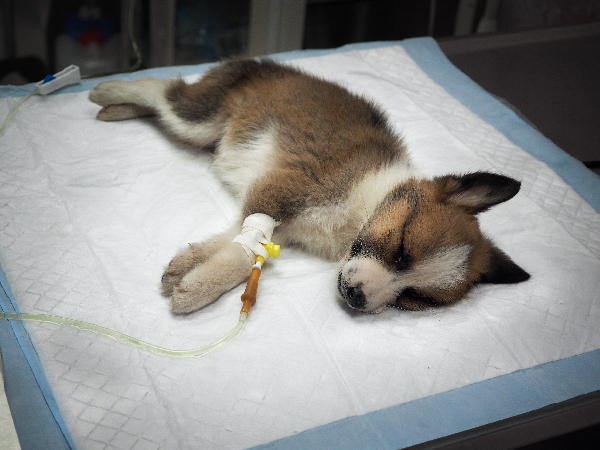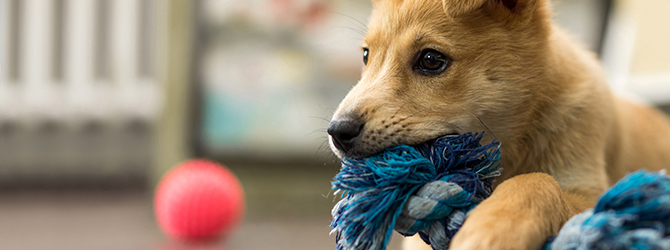Puppy vaccinations: answering your questions
First Published: 23/07/2020
Last Updated: 04/11/2024
Vaccinating your puppy is a hugely important aspect of keeping them safe and healthy. But in recent years, puppy vaccination rates have fallen slightly. In the UK, only around 80% of dogs have been vaccinated putting them at risk of deadly diseases such as leptospirosis and canine distemper. Factors like insurance and neutering status affect these rates, with insured dogs (89%) and neutered dogs (84.7%) more likely to be vaccinated. Vaccination rates also vary across regions, from 75.4% in Scotland to 86.1% in East England, and dogs in better off areas are more often vaccinated.
In this article, we look at some of the most-searched ‘puppy vaccinations’ queries on the web and dispel some of the myths around them.
Do puppies need vaccines?
Yes! While there’s debate around this in the media, any qualified veterinary professional will tell you that puppies absolutely need to be vaccinated. They should be given an initial course of vaccines, and then booster injections throughout their life to ensure they stay protected.
Vaccinations are effective at keeping puppies and adult dogs protected against a range of infectious diseases, some of which — like leptospirosis and infectious canine hepatitis — can be fatal.
Why are vaccinations important for puppies?
Vaccinations are highly recommended because a puppy’s immune system isn’t strong enough to fight off infections on its own. After birth, puppies receive some immunity from their mother’s milk, especially in the first few days when it contains colostrum, rich in antibodies. However, this protection wears off over time, usually by the age of 14 to 20 weeks.
Vaccinations teach a puppy’s immune system how to fight specific infections and diseases. The vaccination process replaces the maternal antibodies as they fade, providing vital protection as the puppy’s own immune system develops.
When do puppies need vaccines?
Young puppies need their first course of vaccinations when they’re 6-10 weeks old. Known as a ‘primary course’, this procedure will consist of 2-3 injections (of the same brand of vaccine) and they’ll be administered 2-4 weeks apart.
Most puppies bred by a responsible breeder will have had their first set of vaccinations before you bring them home. Your breeder will be able to advise further.
Read more: Finding a good puppy breeder: things to consider when buying a dog
When do puppies get their second injection?
The second set of vaccines, included within your puppy’s ‘primary course’, will be administered 2 - 4 weeks after the first set.
Your puppy may get their second set of vaccines at 8-12 weeks of age, providing they had their initial vaccinations at 6-8 weeks.
How much are puppy vaccinations?
The cost of puppy vaccinations will depend on the vet practice you attend but can range from just over £50 to upwards of £150. There’s no fixed price for puppy vaccinations. Prices have increased in recent years due to increased costs for medical supplies and equipment, rising general overhead costs and rising demand for veterinary services.
We recommend joining Pet Health Club. You can keep your dog fully vaccinated against parvovirus, leptospirosis, canine distemper, hepatitis and kennel cough, all year every year.
This includes your puppy’s primary vaccine course, their monthly flea treatment and worm treatment, plus regular health checks with your vet and much more.
Locate your nearest Pet Health Club practice here.
Can you administer puppy vaccinations at home?
In most cases, you’ll need to bring your puppy to the vets. That way, they’ll be safe, and you can rest assured the vaccine is being administered by a trained professional.
In some cases, your vet may visit you to administer your puppy’s vaccine at home. If you have any queries, don’t hesitate to contact your local vet. They’ll be more than happy to advise further.
When can I take my puppy for a walk?
It’s always best to ask your vet and take their advice, but generally speaking, you will be able to take your puppy out for a walk two weeks after their second jab.
Unvaccinated puppies are susceptible to picking up viruses and infectious diseases, such as parvo and distemper, because they will spend lots of time sniffing and licking as they explore their surroundings.
Once the recommended waiting period has passed, and your puppy is fully vaccinated, you can start taking them outside and letting them socialise with other dogs. Begin with short trips, gradually building up to longer walks as they get more comfortable.
What side effects can puppies get from vaccinations?
Because of the nature of vaccines and the fact that, for them to work, puppies are given a little bit of the disease to prime their defences, your puppy may experience mild reactions to the vaccine. Whilst these reactions are usually mild and uncommon, it is important to be aware of potential symptoms:
- Lethargy
- Loss of appetite
- Fever
When is it safe for my puppy to go outside?
You should only take your puppy out for walks once they’re fully vaccinated and your vet has given you the go-ahead.
Of course, before they’ve been vaccinated, you can still let them out into the garden to do their business and maybe carry your puppy out into the street to greet friends or relatives.
The important thing is not to let your puppy come into contact with other pets or areas where other dogs have been until they’re fully protected. This will help reduce the risk of viral disease.
Parvovirus in puppies
Parvovirus is a highly contagious virus that can spread through direct and indirect contact. It has severe consequences, especially for young and unvaccinated puppies. Parvovirus in dogs is typically spread through saliva or feces, and vigilance is essential when socialising puppies in high-risk areas.

Case Study: Surviving Parvovirus
Cooper's real-life story highlights the importance of verified vaccinations. He contracted parvovirus after his owner was given fake vaccination papers. Thankfully, after intense treatment, Cooper survived. Always confirm that your breeder provides accurate vaccination records for your puppy.
Can unvaccinated puppies be around vaccinated dogs?
If you have another dog at home and they’re up to date with all their booster vaccinations, then it’s fine for them to socialise with your new puppy.
When it comes to taking your puppy out on walks, there’s no way of knowing whether the new dogs you encounter are fully up to date with their vaccines.
It’s best to avoid walking your new puppy in public until their full primary vaccine course has been administered.
How often do puppies need injections?
Your puppy will need booster vaccinations every year. Once they’ve had their primary vaccine course, your vet will advise you to book your puppy in for their first booster vaccination in 1 year’s time.
Not all conditions need to be vaccinated against every single year. For example, the parvovirus booster is only needed every three years. However, conditions like leptospirosis require annual vaccinations.
I’m travelling abroad. Will my dog need injections?
Before travelling abroad, your dog will need a pet passport or in some cases an Animal Health Certificate. To obtain a pet passport or an AHC, they'll need certain vaccinations.
Vaccinations required will depend on the country you plan to visit but in many cases, your dog will need a vaccination against rabies. Always allow plenty of time for preparation before you travel, and speak to your vet well in advance.
How old does a puppy have to be to get a rabies vaccine?
Rabies does not currently occur in the UK, so your puppy will only need a rabies vaccination if you plan to take them abroad or if you’re buying them from another country.
Your puppy must be microchipped before they can receive a rabies vaccination. Most rabies vaccinations won’t be administered when your puppy is younger than 12 weeks old.
How long is a dog's rabies vaccine good for?
If you live in the UK with your dog/puppy, they’ll only need to be vaccinated against rabies if you’re taking them abroad. If this is the case, your pet will need their rabies vaccine at least 21 days before you return home.
In countries where rabies is still a threat, the rabies vaccination is a core vaccine, given as part of the primary course and yearly boosters.
When can my puppy go in the garden?
If your garden is secure and safely closed off from other dogs, your puppy can go outside straight away. Introducing your puppy to the garden builds their confidence and familiarises them with their new environment. Taking them outside is also great for toilet training.
When can I take my puppy for a walk?
It’s best to follow your vet’s advice, but generally, you’ll be able to take your puppy out for a walk two weeks after their second jab.
Unvaccinated puppies are susceptible to picking up viruses and infectious diseases like parvo and distemper. Fully vaccinated puppies can then safely socialise with other dogs, beginning with short walks and gradually increasing.
Need more info?
For further advice on vaccinating your puppy, chat with your local vet.
Find your nearest vet using our Find a Vet page, or speak to a vet online using Online Vets.



